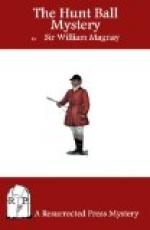“I don’t suppose we are wanted,” Kelson said quietly to Gifford; “let’s go for a turn round the garden. I wonder where Muriel has got to.”
They found Miss Tredworth on the lawn. “I am waiting for Edith,” she said.
“We’ll stroll on and Gifford can bring Miss Morriston after us,” Kelson suggested, and the lovers moved away, leaving Gifford, much to his satisfaction, waiting for Edith Morriston.
In a few minutes she made her appearance. Gifford mentioned the arrangement and they strolled off by the path the others had taken.
It seemed to Gifford that his companion’s manner was rather abnormal; unlike her usual cold reserve there were signs of a certain suppressed excitement.
“I hope,” she said, “that Major Freeman and his people are satisfied with our discovery that the marks on Muriel’s dress and mine came there by accident.”
“Evidently quite convinced,” Gifford answered.
“That’s well,” she responded with a rather forced laugh. “It was rather too bad to suspect us, on that evidence, of knowing anything about the affair.”
“I don’t suppose for a moment they did,” Gifford assured her.
“I don’t know,” the girl returned. “Anyhow it was rather an embarrassing, not to say painful, position for us to be in. But that is at an end now.”
Nevertheless Gifford could tell that she was not so thoroughly relieved as her words implied.
“Completely,” he declared. “You have heard of the new piece of evidence?” he added casually.
For a moment she stopped with a start, instantly recovering herself. “No; what is that?” in a tone almost of unconcern.
Gifford told her of the statement made by the country girl and its corroboration in the finding of the rope. As he continued he felt sure that the story was gripping his companion more and more closely. At last she stopped dead and turned to him with eyes which had in them intense mystification as well as fear.
“Mr. Gifford, do you believe that story?”
“I see no reason for disbelieving it,” he answered quietly. “It is practically the only conceivable solution of the mystery of the locked door.”
“Surely—” she stopped, checking the vehement objection that rose to her lips. “This girl,” she went on as though searching for a plausible argument, “is it not likely that she was mistaken? We know what these country people are. And she could not have seen very clearly.”
“But,” Gifford argued gently, “her statement is confirmed by the finding of the rope.”
Edith Morriston was thinking strenuously, desperately, he could see that. The words she spoke were but mechanical, the mere froth of a seething brain. Yet her splendid self-command—and he recognized it with admiration—never deserted her, however supreme the struggle may have been to retain it.
A seat was by them; she went across the path to it and sat down. Gifford saw that she was deadly pale.




